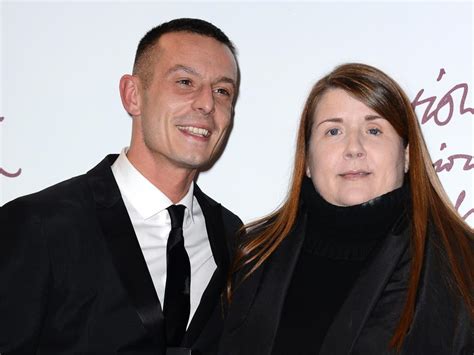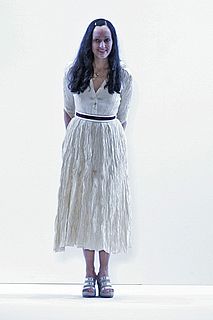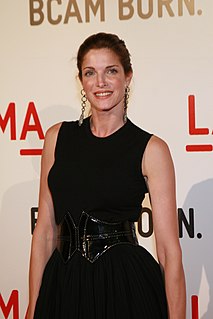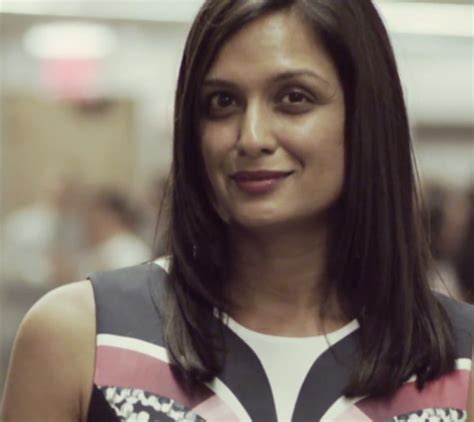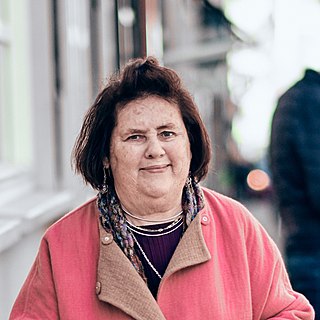A Quote by Valerie Steele
Fashion has been collected and exhibited for many years. People were picking up clothing of famous individuals, like Marie Antoinette's shoe or Napoleon's hat. That part of the resistance to having fashion in museums had to do with it being associated with femininity, and with the female body. Yet, as early as the 18th century, some people were recognizing that just as you collected art, you, might think about collecting fashion for museums, because it would provide insight into the way people thought about their lives and, and the way they envisioned themselves.
Quote Topics
About
Art
Associated
Because
Been
Being
Body
Century
Clothing
Collected
Collecting
Early
Envisioned
Famous
Fashion
Female
Female Body
Femininity
Had
Hat
Having
Individuals
Insight
Just
Like
Lives
Many
Marie
Might
Museums
Napoleon
Part
People
Picking
Provide
Recognizing
Resistance
Shoe
Some
Some People
Themselves
Think
Thought
Up
Way
Were
Would
Years
Related Quotes
I think fashion is probably one of the most accessible and immediate forms of visual culture. In 1978, when I realized that I wanted to work on fashion, I had gone to Yale to get my Ph.D. in European cultural history. I suddenly realized fashion's part of culture, and I can do fashion history. All my professors thought this was a really bad idea, that fashion was frivolous and unimportant. And, increasingly over time, people have recognized that it provides such a mirror to the way we think, our values and attitudes.
Fashion rests upon folly. Art rests upon law. Fashion is ephemeral. Art is eternal. Indeed what is a fashion really? A fashion is merely a form of ugliness so absolutely unbearable that we have to alter it every six months! It is quite clear that were it beautiful and rational we would not alter anything that combined those two rare qualities. And wherever dress has been so, it has remained unchanged in law and principle for many hundred years.
My own feeling about JJ, without knowing anything about him, was that he might have been a gay person, because he had long hair and spoke American. A lot of Americans are gay people, aren’t they? I know they didn’t invent gayness, because they say that was the Greeks. But they helped bring it back into fashion. Being gay was a bit like the Olympics: it disappeared in ancient times, and then they brought it back in the twentieth century. Anyway, I didn’t know anything about gays, so I just presumed they were all unhappy and wanted to kill themselves.
I think the problem is that fashion has become too fashionable. For years, fashion wasn't fashionable. Today fashion is so fashionable that it's almost embarrassing to say you're part of fashion. All the parodies of it. All the dreadful magazines. That has destroyed it as well, because everybody thinks fashion is attainable.
I guess I just developed more of an interest to actually be a part of the design, picking out the fabric and just being more involved. I never really considered myself a fashion person, but then I just realized that fashion is just another way of self expression and that's pretty much what I'm most passionate about.
I would love to do a period piece - in the 18th or 17th century. To me, it would be such an incredible challenge because of the way people carried themselves. There are so many incredible stories within those centuries - just the language and the way they carried themselves and what they were going through.
Fashion wears many faces; it has the urge to belong to a group - to charm - but also the urge to be exclusive and snobbish to carve out individuality. That is the genius of fashion! Fashion is what time looks like, and it's up to us all to shape what our own time looks like. Fashion is a collaborative art form in this way... We all paint the picture.
When I first started to do fashion shows I didn't have the budget to hire top models so I would cast women who inspired me, and ask them to walk how they walked. I was doing a mise en scène, which for me was normal. I love for people to see my clothes, but it was more about the attitude of the girls. The revues of the late 19th century/early 20th century were very much a reflection of what was happening in society and politics, and for me that is also the role of the fashion designer.
Fashion Week was at Bryant Park and there were a few shows like Marc Jacobs, or when Alexander McQueen came to town, that were offsite, Helmut [Lung] was offsite, but it was very intimate. It wasn't the way it is today where you have a thousand people at the show. You may have had 200 to 250 and it was really the trade and you know fashion greats.
You're taught that you need to please magazines, to please the fashion elite, and that if you do everything the right way, everyone is going to love you. But I decided not to follow some of the rules. My girls from the runway were not just models - they were soldiers. They helped me bring my ideas to life. I was talking about sexiness, about diversity, about different shapes of bodies. I was following my instincts and learning that it would not please the fashion elite. And I think this is the real luxury, to be free to express yourself. Freedom is luxury to me.





